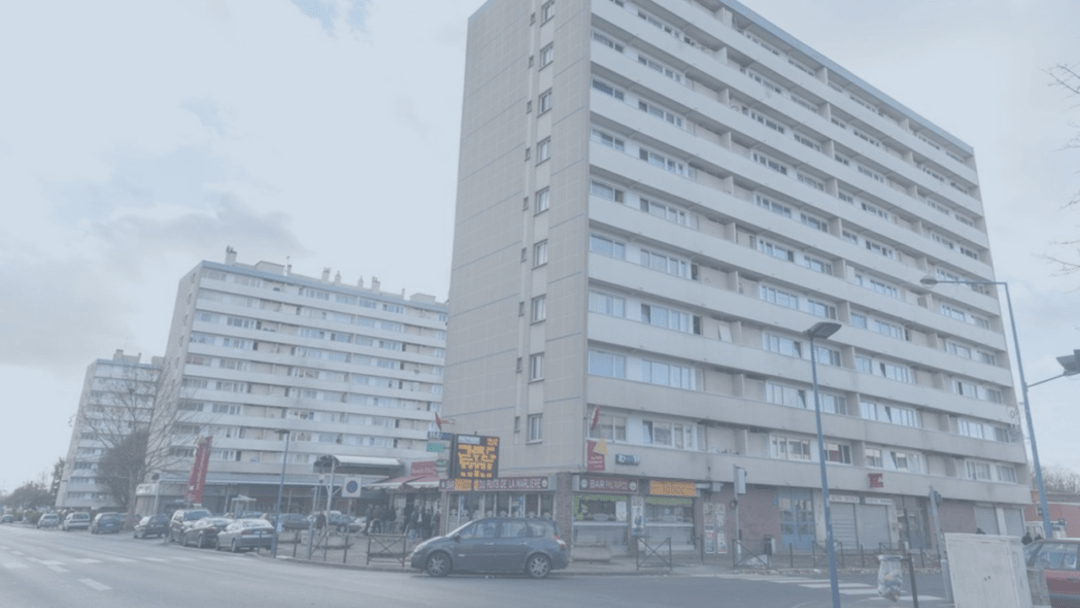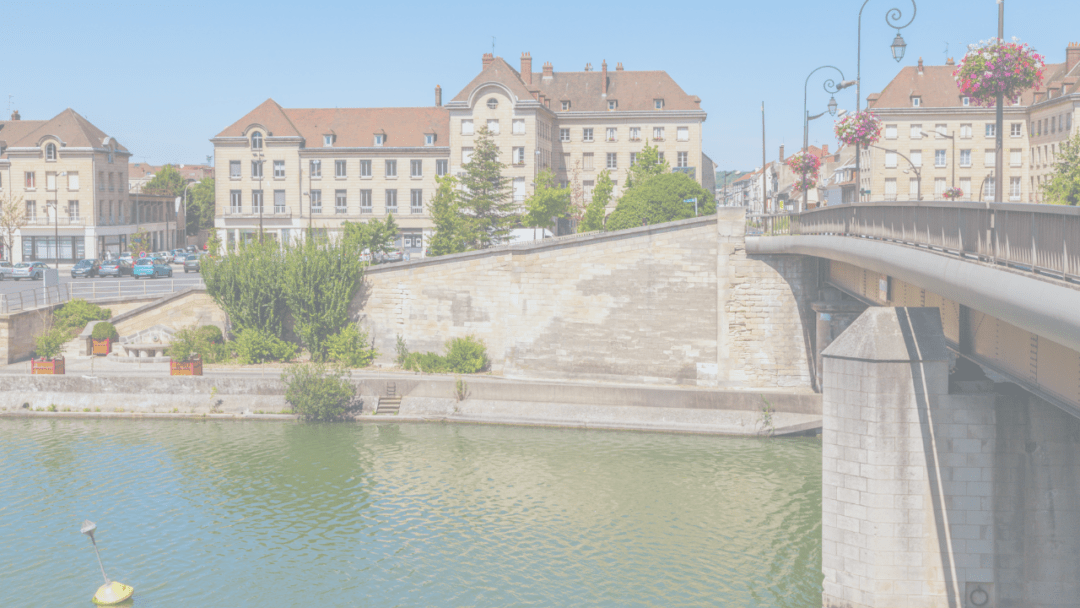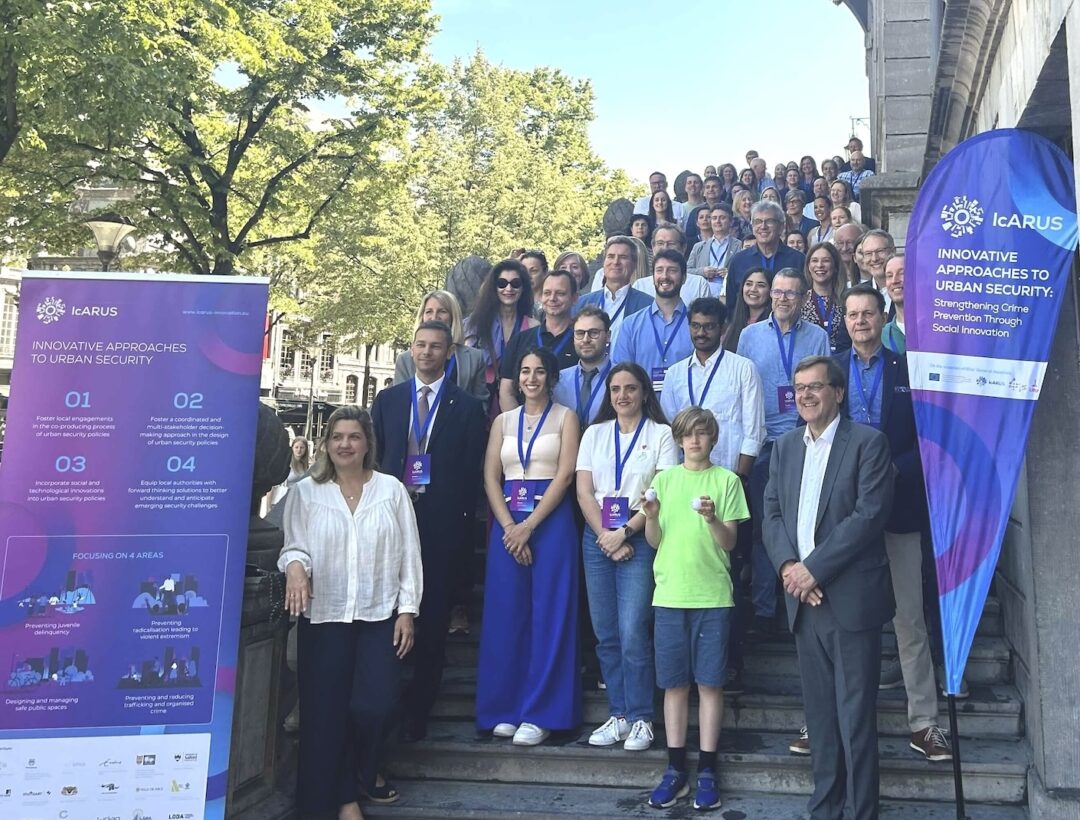Paris, France, January 2021 – How can cities and local security actors better protect their vulnerable public spaces? That is the question that the PACTESUR project (Protecting Allied Cities against TErrorism by Securing Urban aReas), led by the City of Nice (France) and in which Efus is a partner, has been exploring since January 2019. Two years down the line, the Efus team can review its progress so far and assess the challenges that lie ahead.
I. A global and integrated approach on the protection of public spaces
The PACTESUR project aims to empower cities and local actors in the field of security of public spaces, mainly in the face of terrorist threats, but also against other risks inherent to public spaces. Through a bottom-up approach, PACTESUR gathers local decision makers, security forces, urban security experts, urban planners, front-line practitioners, designers and other professionals in order to shape new European local policies to secure public spaces against different threats.
A project that follows up on the Declaration of Nice
The PACTESUR project follows a series of initiatives by the city of Nice, with the support of the European Commission and Efus, in the field of the prevention of and protection against terrorist threats affecting public spaces. As a member of Efus, this municipality promoted the Declaration of Nice, which was co-written by the Euromed network and Efus and adopted by both networks alongside 60 mayors from 18 countries. It was published at the end of the Conference of Mayors of the Euro-Mediterranean region organised in 2017 by the city of Nice and Euromed with the support of Efus, the University of Toulouse Jean Jaurès and the University of Nice Sophia Antipolis.
The Consortium
The PACTESUR project is led by the city of Nice. The consortium includes the city of Liège (Belgium), the city of Turin (Italy), the National Association of Italian Municipalities (ANCI) Piemonte (Italy), the European Forum for Urban Security (Efus) and the Métropole Nice Côte d’Azur.
Four pillars to improve public space protection
The project focuses on four main pillars around which the partners are exchanging their experiences and reflections:
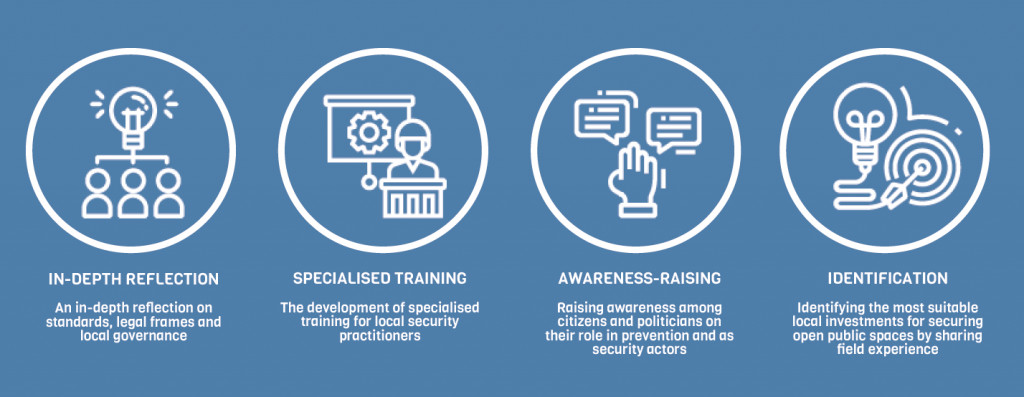
The role of Efus
Efus is leading a working group of 11 European cities (Athens, Edinburgh, Essen, Gdańsk, Leeds, Lisboa, London, Madrid, Munich, Riga, Xàbia) that have specific issues and knowledge on the protection of urban public spaces, as well as the Expert Advisory Committee (EAC), a group of 14 specialists from various fields who are working on how to design safe, open and accessible public spaces. It also leads two thematic working groups on “European standards” and “Transnational cooperation“ set up with the 11 Associated Cities and the EAC.
Furthermore, Efus is coordinating the Publication Series, a collection of articles, interviews and guides written by the project’s Associated Cities and the EAC with the aim of contributing to the European debate on the protection of public spaces. Topics include, among others, the challenges of Covid-19, protecting places of worship, raising citizens’ awareness, the impact of urban planning and design in feelings of (in)security, and the importance of art in public spaces. Because the security challenges affecting public spaces are in constant evolution, this collection intends to be a space for reflection and discussion on these issues.
Establishing synergies with other European projects
Efus is disseminating the results of the PACTESUR project throughout Europe by taking part in conferences and seminars, such as the Security by Design event organised by Bruxelles Prévention & Sécurité in May 2019, the Congrès sur la Santé, sécurité et qualité de vie at Préventica Marseille in October 2019, and the workshop organised by the European SafeCi project in December 2020.
A project that is part of a European reflection on the protection, planning and sharing of public spaces
Public spaces constitute a specific area of urban security: they require a security policy that is based on cooperation between the different organisations and institutions concerned (local authorities, police, emergency services, user representatives…), in other words a genuine co-production of security that guarantees that they be both safe and open and accessible to all. European cities are confronted with similar challenges regarding their public spaces. Furthermore, security practices can be transposed from one city to another across Europe. Thus, the sharing of experiences contributes to improving local action but also to creating a collective knowledge.
Efus is currently participating in other European projects related to the protection of public spaces: PRoTECT, Secu4All, Cutting Crime Impact (CCI) and IcARUS. Efus is also coordinating with the cities of Nice and Madrid (Spain) the Partnership on the safety of public spaces of the Urban Agenda for the European Union.
II. New challenges
Securing urban public spaces in the face of evolving threats, while ensuring they remain open and accessible to all
An evolving terrorist threat
Security, notably terrorism, was one of the main motives for concern for European citizens as per the December 2017 Eurobarometer of the European Commission. The latest Eurobarometer, dated October 2020 shows that it is now less of a concern, ranking in ninth place, with only 7% of respondents mentioning it as a top priority compared to 44% three years earlier1.
Although there has recently been a slight decrease in terrorist attacks in the European Union (EU), the latest wave of attacks in France (Conflans Ste Honorine and Nice, October 2020), Germany (Dresden, October 2020) and Austria (Vienna, November 2020) show that the terrorist threat remains high in Europe. Public spaces continue to be targeted, including places of worship. Because they are open to all, they are vulnerable to different types of threats and modus operandi (ram-vehicles, knives, firearms, explosives or guns). The evolution of this threat, which has become more diffuse and therefore more difficult to anticipate, remains a major challenge for the EU Member States.
In order to understand the security challenges in public spaces, any other type of incident that has an impact on these spaces and that is likely to mobilise various security actors must be taken into account. The PACTESUR project thus includes crowd management and panic movements, but also climatic risks, such as fires or floods.
The impact of Covid-19 in public spaces
As stated in the new EU strategy for the Security Union, adopted in June 2020, the Covid-19 crisis has “reshaped our notion of safety and security threats” and “has highlighted the need to guarantee security both in the physical and digital environments.” 2
The pandemic has also changed the way we think about and use public spaces. Cities and their users are now favouring open-air events, pavements are being widened to ensure social-distancing among pedestrians, and temporary terraces are being set up, sometimes too close to the road. These changes have created new situations that PACTESUR must also tackle in order to make sure they do not create new vulnerabilities in public spaces.
As such, the question to which the PACTESUR project seeks to respond is: how to secure urban public spaces in the face of evolving threats, while ensuring that they remain both safe, open and accessible to all?
III. The activities of the PACTESUR project
Creation of a multidisciplinary network of local actors
The sharing of knowledge, good practices and tools not only between representatives of European local authorities and local security actors, but also between town planners and security and terrorism experts is essential for the development of new local policies to secure public spaces against threats.
The project has helped build and consolidate a multidisciplinary exchange network between actors involved in the security of European public spaces.
PILLAR 1: In-depth reflection on standards, legal frames and local governance
Local authorities play a fundamental role as they are the level of governance closest to citizens. As such, local security governance is a key issue for the project partners. The project organises three annual meetings in order to identify priorities and to prepare a comparative study of local governance standards in different European countries, with recommendations to national governments and European institutions.
Legislation differs from one European country to another, and this has a direct impact on crisis management and emergency responses. This leads the PACTESUR project to continue to reflect on the idea of creating a common European framework. One of the outcomes of the project will be a comparative study of the current legislations in different European countries, with recommendations for national governments and European institutions.
PILLAR 2 : The development of specialised training for local security practitioners
The PACTESUR project offers specialised training courses for European security actors in the three partner cities in order to equip them with the necessary knowledge and tools to better secure their public spaces.
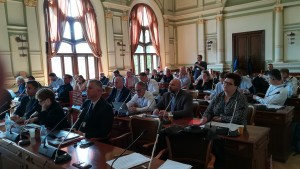
During the European Week of Security in Nice in September 2019, a 3-day training course was given to 45 police officers from 15 European cities at the Arnaud Beltrame Training Centre at the Russian Battery Fort. The police officers also visited the tramway security installations. Two more training sessions are planned in Turin and Liège this year (2021).
PILLAR 3: Raising awareness among citizens and politicians on their role in prevention and as security actors
Bringing together European local stakeholders, police representatives and experts, the European Weeks of Security of Nice, Turin and Liège are major dissemination events for PACTESUR, contributing to raise awareness among citizens and local politicians on their role in prevention and as security actors. It is also an opportunity to present the project’s main results and exchange with the representatives of the Expert Advisory Committee and Associated Cities on their experience in protecting public spaces across Europe.
The first European Week of Security was held in Nice in October 2019, and the second one was virtually hosted by the City of Turin in October 2020. Topics included the terrorist threat, crisis management and communication, urban planning and the use of digital tools. The Second Week also addressed the impact of Covid-19, including the risks posed by digital surveillance, which have been exacerbated by the health crisis, as well as the management of social anxiety in public spaces.
Through open debates such as the Local Governance Workshops or the European Security Weeks, the project aims to give a voice to citizens and civil society in debating on security and public spaces.
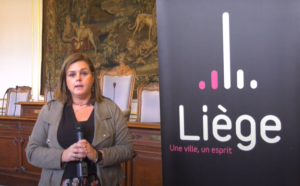

The role of the Sustainable Design School
The Sustainable Design School (SDS), which is based near Nice in Cagnes-sur-Mer, is an associate partner of the PACTESUR project. Through field interviews, the School carried out a study on the feeling of insecurity of people using the Promenade des Anglais in Nice. This approach, presented at the Local Governance Workshop in Nice, ensures that the needs and expectations of public space users are collected and analysed when designing safer public spaces – as it includes a multi-actor diagnostic at local level.
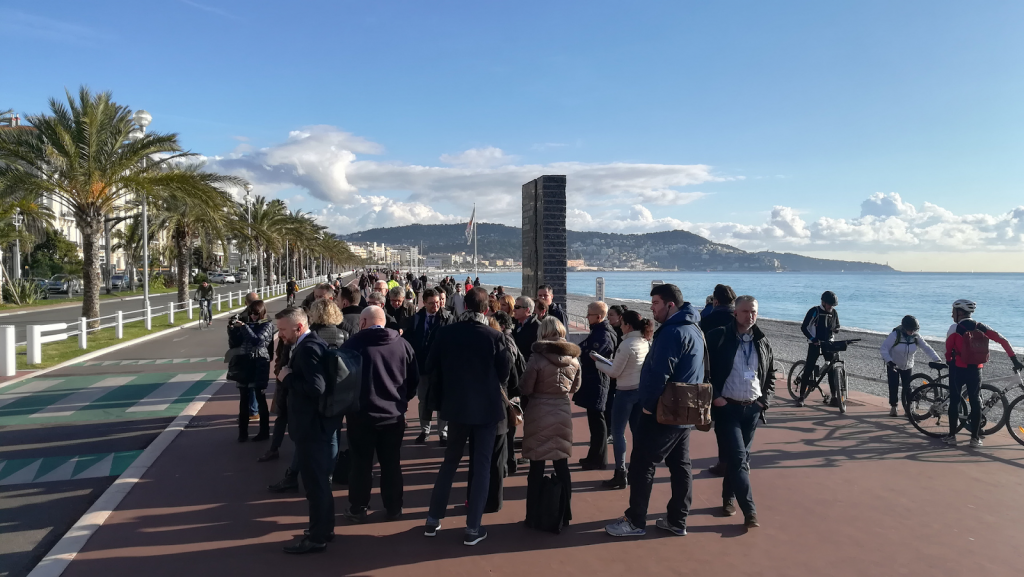
PILLAR 4 : Identifying the most suitable local investments for securing open and touristic public spaces by sharing field experience
The project is testing pilot security equipment/infrastructure for securing public spaces in Nice, Liège and Turin, which can be transferred to other European cities. Particular attention is given to their integration into the urban landscape, natural and cultural heritage, aesthetics, design and urban mobility to avoid the “bunkerisation” of cities. These security devices also reflect the different approaches of these three cities when securing urban public spaces.
- In Liège, a mobile vehicle barrier to protect the Place Saint Lambert and Le Carré is currently being set up.
- In Turin, a high-tech crowd control system will be installed in Piazza Vittorio Veneto, with the aim of avoiding panic-driven movements, such as the one in June 2017 during the outdoor projection of the Champions League final.
- In Nice, a reinforced anti-intrusion device to protect the Promenade des Anglais has been developed, notably to prevent attacks such as that of 14 July 2016 by a ram truck. In December 2019, representatives of the associated cities, the EAC and the consortium visited the Promenade des Anglais and then drafted recommendations for the City to improve the performance of the equipment and its integration into the urban landscape.
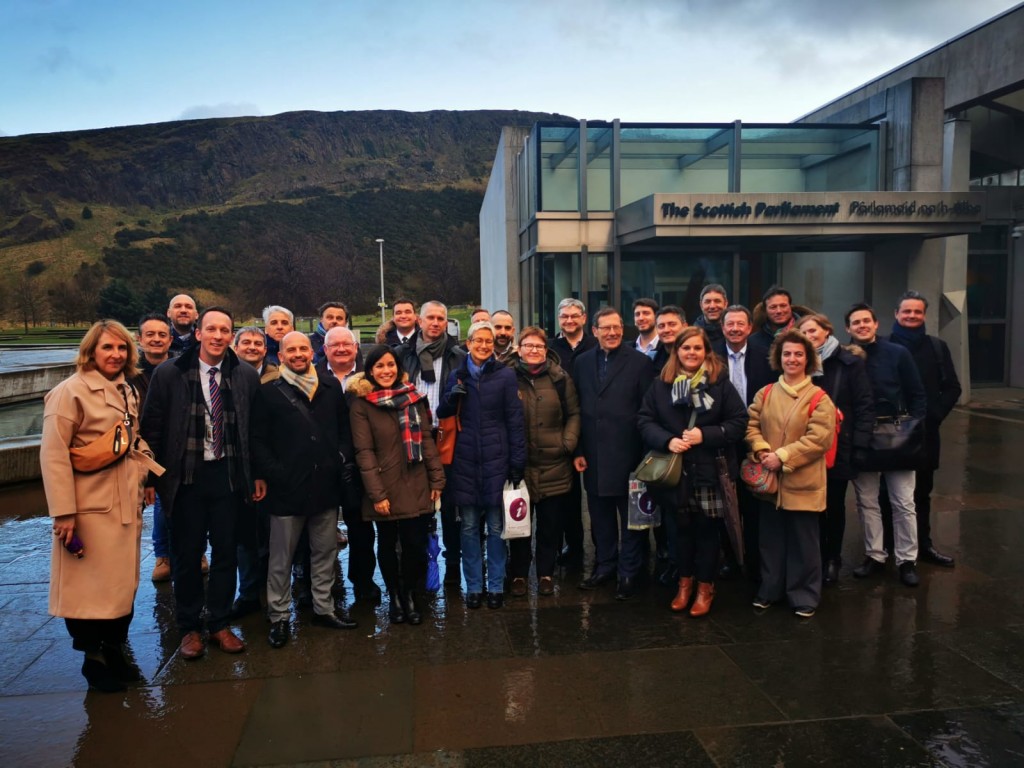
The project’s next steps in 2021
The final publication of the project will include various case studies and factsheets including concrete tools on a variety of topics, such as communication, innovation and cooperation in crisis management.
- May 2021: Second Local Governance Workshop in Liège
- Autumn 2021: Third Annual Meeting, hosted by one of the Associated Cities & Third and final Local Governance Workshop in Turin, as well as specialised training for security actors.
- October 2021: The project partners will present PACTESUR’s results at Efus’ Security, Democracy and Cities international conference, (20-23 October, Nice, France).
1. Eurobarometer 2020 of the European Commission – https://ec.europa.eu/commfrontoffice/publicopinion/index.cfm/Survey/getSurveyDetail/instruments/STANDARD/surveyKy/2262
2. Communication from the Commission of 24 July 2020 on the EU Security Union Strategy https://eur-lex.europa.eu/legal-content/EN/TXT/PDF/?uri=CELEX:52020DC0605&from=FR
About PACTESUR
The PACTESUR project aims to empower cities and local actors in the field of security of urban public spaces facing threats, such as terrorist attacks. Through a bottom-up approach, the project federates local decision makers, security forces, urban security experts, urban planners, IT developers, trainers, front-line practitioners, designers and others in order to shape new European local policies to secure public spaces against terrorist attacks

Contact:
Tatiana Morales, Programme Manager: morales@efus.eu
Martí Navarro Regàs, Programme Manager: navarroregas@efus.eu
Marta Pellón Brussosa, PACTESUR Communication Officer: pellonbrussosa@efus.eu

